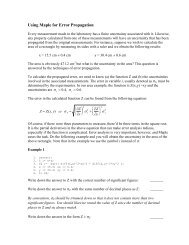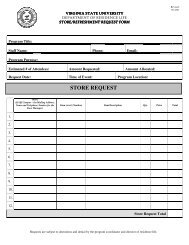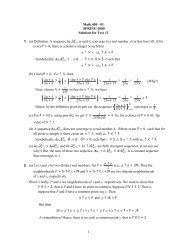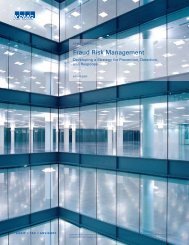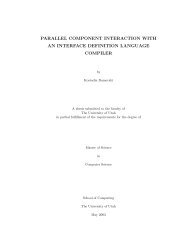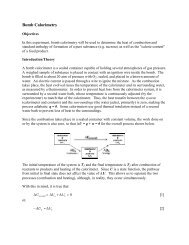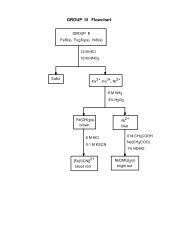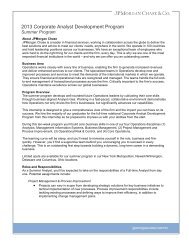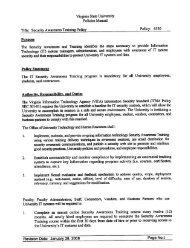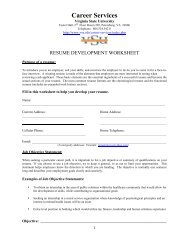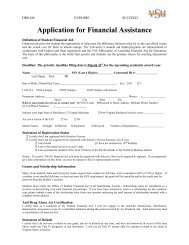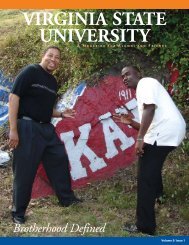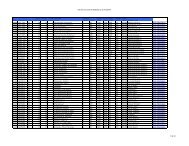Winter 2008 - Virginia State University
Winter 2008 - Virginia State University
Winter 2008 - Virginia State University
- No tags were found...
You also want an ePaper? Increase the reach of your titles
YUMPU automatically turns print PDFs into web optimized ePapers that Google loves.
10News from <strong>University</strong> AvenueSmall-Scale PrivateAnimal Health Carein Ethiopia MadeSustainableUsing small agribusiness management trainingprovided through an assignment by VSU Farmer-to-Farmer Program, volunteer Dr. Jerry Nolte in March2006, helped animal health product supplierTekaligne Abebe increase sales by 32 percent andnet income by 37 percent in just three months.Nolte traveled to Ethiopia in March under <strong>Virginia</strong><strong>State</strong> <strong>University</strong>’s (VSU’s) USAID-funded Farmer-to-Farmer Program. One of VSU’s major activities inEthiopia is contributing to the success of the USAIDfundedEthiopia Dairy Development Project beingimplemented by Land O’Lakes (LOL). VSU’s volunteerUS agribusiness development experts provide handsonbusiness development training to EDDP-selectedinput suppliers. The aim is to increase suppliers’profitability and the quality, volume, and sustainabilityof dairy production in Ethiopia.Abebe operates an animal health care service and drugsupply business in the Chancho District of Ethiopia.Trained as a veterinarian, he has a total of 16 yearsprofessional experience in animal heath care, the last10 years as a private vendor. Land O’Lakes selected himas a lead animal health care provider to be targeted byEDDP to improve service delivery to smallholder andcommercial dairies in the Chancho District.Although he had extensive experience with managinghis business, Adebe had never had formal training inthe fundamental techniques of business management.He spent a total of 52 hours in group and one-on-onetraining with Nolte. With this training, he established acomputer spreadsheet-based accounting system totrack income and expenses and manage inventory.At the same time, Nolte evaluated Adebe’s pricingpractices and discovered that he was marking up hisproducts by 25 percent. The resulting high prices weremaking it difficult for Adebe to attract buyers incompetition with black market suppliers operating inthe district. Nolte advised Adebe to reduce his mark-upto 10 percent and focus on maximizing volume of salesrather than profit per unit. Increasing his customer basewould also help him increase sales of his veterinaryDr. Jerry Nolte (l) and Tekaligne Adebeservices. Nolte also advised Adebe to join with othervendors in the district to buy supplies in bulk in orderto reduce transportation expense and qualify for bulkdiscounts.Results achieved:■ Adebe is using a computer spreadsheet to managehis business income, expenses and inventory.■ Adebe persuaded other nearby veterinary serviceproviders to join him in a buying club. The buyingclub succeeded in buying products on behalf of allmembers and negotiating volume discounts withsuppliers, as well as reducing its membersexpenditures for transportation.■ Adebe increased his gross income from drug salesand health care services by 32 percent – from 25,200Birr during the first quarter of 2006 – prior to Nolte’svisit – to 33,275 Birr during the second quarter of2006, immediately following Nolte’s visit.■ Adebe’s net income increased 37 percent – from4,993 Birr to 6,856 Birr – in the same period.■ Including Adebe, Nolte provided training to a total of44 input suppliers – 11 feed dealers, 20 animal healthservice providers, and 13 artificial inseminators –including 3 women. It is likely that many of thesealso increased their sales and profits making use ofthe training Nolte provided. VIRGINIA STATE UNIVERSITY



